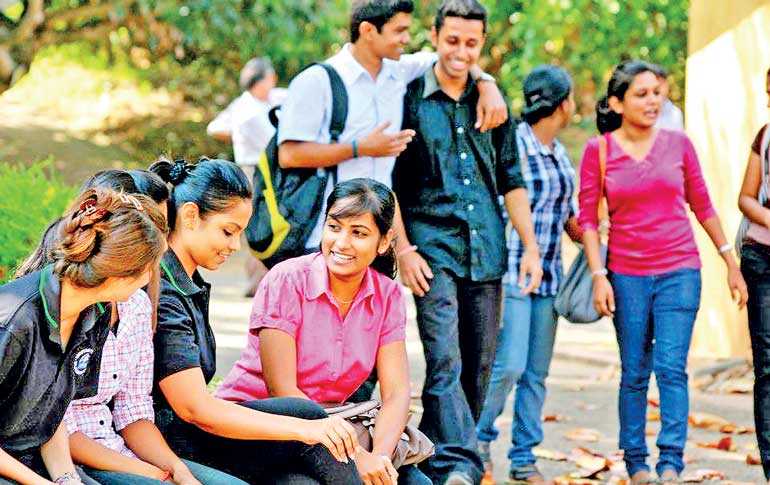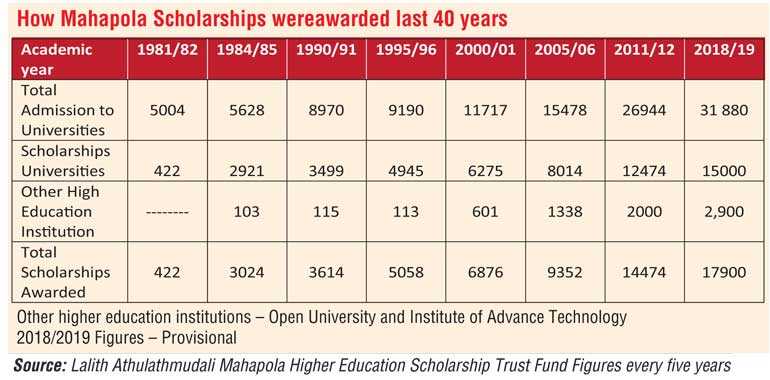Monday Feb 23, 2026
Monday Feb 23, 2026
Tuesday, 12 January 2021 00:59 - - {{hitsCtrl.values.hits}}

One may dispute that a program of this nature was planned to gain long-term political mileage. But today this program has become highly successful and a popular project beneficial to those needy students of the country. It is very rare that this system of a program is found around the globe
The majority of students (over 60%) who entered national universities are fortunate enough to utilise the benefits of the great Mahapola Scholarship Scheme introduced by the late Minister Lalith Athulathmudali in 1981.
It was a time when students had to undergo formidable challenges in meeting their needs through bank loans which were a gargantuan task to obtain. In such an eventuality the expenses were borne by their parents under great hardships. Implementation of the Mahapola Scholarship at this crucial moment became a friend in need with the grant of financial assistance to those hapless students.
In 1981, the grant of financial aid under Mahapola Scholarship Scheme had been limited to 422 students. Later with the development of this foresighted concept Mahapola Scholarship program, it has become a great social beneficial fund being able to offer scholarships to over 60% students of national universities irrespective of their different status.
It has been unequivocally accepted that Mahapola scholarship program was the concept of late Lalith Athulathmudali, the then Minister of Trade and Shipping. Mahapola Scholarship program was founded and became effective in 1981 with the support of all his staff and institutions under the purview of his Ministry became a fruition of untiring effort. Later in recognition of its national importance, a greater contribution of funds was made by the general public and well-wishers in support of building the strength of the program.
One may dispute that a program of this nature was planned to gain long-term political mileage. But today this program has become highly successful and a popular project beneficial to those needy students of the country. It is very rare that this system of a program is found around the globe.
After a long period of a 40-year experience, it would be of great importance to review the history of Mahapola Scholarships particularly the hard work responsibly dedicated at the initial stage of this proposal by all those involved. In 1981 the road to glory of success was not as smooth as anticipated. It was the contribution of all the employees of institutions under the purview of the Ministry of Trade and Shipping with the leadership of Lalith Athulathmudali. Being the writer of this article, it gives me great pleasure in recalling my experience as a strong partner among thousands of supporters who made an enthusiastic contribution to strengthen this scholarship at the beginning. Athulathmudali requested the writer to prepare an analytical report on the successful achievement of Mahapola for the period up to mid-1981. This particular report was published in Paribhogika Handa, a publication carried out by the Ministry of Trade and Shipping.
Mahapola Exhibition Program was launched in 1980 and was held in Government schools situated in rural area raising funds for development of under developed schools. The entire collection from the exhibition was donated to the development of those schools in the area.
Participating at opening ceremonies of Mahapola Exhibitions in 1980s, Minister Athulathmudali in his speeches highlighted the significant need of financial support for students doing higher studies too. On most occasions Athulathmudali impressed his friends and associates including me that even he from a financially well-established family at the Oxford University was troubled by economic hardships being unable to cover university expenses and requested the Government to help him by providing a grant in 1959.
On 24 February 1959 at 5:34 p.m. Dr. W. Dahanayake, the then Minister of Education moved a Supplementary Bill for grant of Rs. 5,000 to a Sri Lankan student named Lalith Athulathmudali to help continue his higher studies at the Oxford University. In moving this bill before the House, Minister Dahanayake emphasised that Lalith Athulathmudali had obtained Second Class Honour Degree and wished to continue his LLB. He himself had made the request since he was handicapped with financial difficulties. The Bill was debated with oratory speeches by S.W.R.D. Bandaranaike then Prime Minister, Dr. N.M. Perera, Edmund Samarakkody, Macan Marker V.A. Kandiah, Vivian Gunawardena, Bernard Zoyza and M.S. Themis et al. in favour and against as well. Dr. Dahanayake in his reply speech reiterated the significant importance of this grant as it was a genuine request for financial assistance which needed timely support. The Bill was passed by the parliament with 33 in favour and 18 against. Most notable event observed was the voting by certain UNP members of parliament against the Bill. (Hansard—Feb. 24, 1959 – folio: 1039.1055)
In recognition of the arguments made at the debate before the House in 1959, Athulathmudali realised that the local university students too were troubled by economic hardships in the same manner in which he experienced at the Oxford in latter part of 1950s. In view of this situation, he decided to launch a long-term solution with financial support to all the students through his Mahapola program. As a result, the foundation was laid for this remarkable program Mahapola Scholarship in 1981.
The story of Mahapola
The story of Mahapola begins with a carnival held in 1979 at the famous Mount Playground in Galkissa to raise funds for social development activities in Ratmalana region by the Ratmalana Development Foundation under leadership of Lalith Athulathmudali, MP for Ratmalana electorate. A large number of trade stalls equipped with different varieties of attractive products at this carnival had been displayed. Most of the products exhibited were of new inventions introduced to the market by the open economic policy at its infant stage.
This trade exhibition reached the apex of its success and it was motivated to develop similar type of exhibitions in rural areas with wider objectives to take the benefits of open economy to the threshold of rural households. As a result, the Mahapola Exhibition was launched in 1980.
The inaugural Mahapola Exhibition was held in Niyagama, Hiniduma Electorate from 2 January to 8 January 1980 with the main objective of moving benefits of trade products and service enjoyed in urban areas to rural area. During the year 1980 twenty Mahapola Exhibitions were successfully organised in other different rural areas as well.
The first Mahapola anniversary held in 1981 at Bandarawela, Bindunuwewa was the significant milestone of Mahapola Scholarship Program. First Mahapola Scholarship Lottery was drawn on 12 January 1981 at the Bandarawela Mahapola by Lalith Athulathmudali. A large number of prizes of high value were awarded to winners and the first prize was a lorry chasse considered as very expensive in the market at the time.
A decision was taken to establish a fund to meet the objective of financial support to the poor university students. The fund was opened with the first contribution made by Athulathmudali and also decided to campaign under the attractive name of Mahapola Scholarship Lottery for fund raising. Even though the lottery was launched by selling the first ticket to President J.R. Jayawardane, it was a big challenge to develop into a large funding program as it was fledgling stage of the project.
But due to the untiring efforts, the program functioned smoothly with foreseeable light at the end of the tunnel. It is an essential factor to educate those students receiving benefits of Mahapola Scholarships during the last 40 years, specially the difficulties confronted by the persons who were involved at the beginning of the project.
In early 1980s National Lottery Draw was the only public lottery drawn in Sri Lanka. As Mahapola Scholarship lottery, newly introduced by the Ministry of Trade, displayed a huge challenge on promoting and selling tickets. In 1980 nearly 27 leading Government institutions like Sri Lanka Port Authority, Sri Lanka Insurance Corporation and State Trading Corporations functioned under the purview of the Ministry of Trade. Most employees of these institutions volunteered themselves in support of this venture. The writer recalls even the executive officers were visiting households in educating the vital importance of the lottery and dedicated in selling tickets. Many private sector companies too advised their staff to buy lottery tickets supposedly influenced by Athulathmudali remarkably successful.
Same system was adopted on selling tickets during the first three years. It was a special feature that no single lottery ticket was sold in lottery booths from 1981 to 1983.
Initially the plan was to build a trust fund with deposits made in the bank and scholarships offered on interest accrued. In January 1983 the Development Lottery was introduced by the new Development Lottery Board instituted with a 50% Capital share from Mahapola Funds on agreement that the amount would be credited to Mahapola Funds from profits made out of the lottery. Thus, Mahapola Scholarship Lottery ended with great success.
Mahapola Schorarship Trust Fund was legally established under Mahapola Trust Fund Act No. 66 of 1981 to run a smooth operation of its funds. The special feature was the appointment of a Board of Trustees with prestigious personalities Chief Justice – the Chairman, Founder and Minister-in-charge of the subject (ex-officio), Secretary to the Ministry of Trade, Secretary to the Ministry of Education and two other members appointed by the Minister in Charge.
The first Mahapola scholarships were awarded at the BMICH in November 1981 and second scholarships were awarded at the opening day of second Mahapola Anniversary held in Galkanda Madya Maha Vidyalaya, Ratnapura in January 1982 under the patronage of J.R. Jayawardena the then President. Nearly 425 scholarships were awarded at the first ceremony. The selection was made on the basis of 10% for best students and balance for more needed students. First three years it was limited only for the university students and extended to Open University and students of Technical Colleges from 1984. The number of awards increasing annually has reached 20,000 scholarships today.
Feather in one’s cap
The Mahapola Fund has become a feather in one’s cap with a huge contribution by the general public considered as a worthy cause and recognised as a well-secured fund like EPF. Unfortunately, it has today fallen into a situation highly pathetic. There has been a lot of flak against the operation of the Fund not as expected by the people. The citizens of the country have a duty bound right to be vigilant over proper functioning of this great Fund.
Mahapola Lottery Fund was utilised mainly for scholarships and other educational projects in need. Before 1980s graduates had to fly abroad for post-graduate studies costing an arm and a leg. At the same time graduates who were financially handicapped were unfortunately left behind helpless. This hapless situation motivated the empathetic Minister Athulathmudali to focus on establishing a Post Graduate Institution for those post-graduate students to continue their higher studies at a minimal charge affordable to them. It is understood that a land had been purchased to build a university for postgraduate studies with modern facilities in Colombo District, but after 1994 the proposal became changed into a private university.
Mahapola was involved in many activities on education especially during the time of Mahapola Anniversary. Libraries were built under the Mahapola Ghanadharshana Program. The establishment of Mahapola Marine Academy with assistance from Port Authority to enhance maritime education in Sri Lanka is a case in point.
It is much appreciated that Mahapola Scholarship Trust Fund was legally renamed in 2018 as Lalith Athulathmudali Mahapola Higher Education Scholarship Trust Fund even late in recognition of his invaluable contribution to the nation.
Late Minister Athulathmudali deserves due recognition as the founder of Mahapola Scholarship for its glorious achievement today. Nevertheless, a large number of supporters whose physical support through blood, sweat and tears virtually helped build Mahapola. They walked from house to house in selling tickets that helped build a huge reservoir of funds. They should be credited in high esteem for their influence in this great accomplishment.
It is the paramount duty of every citizen especially the scholarship awardees to maintain this highly beneficial Scholarship Fund tightly secured for future generations.
In ending the narration of the history of Mahapola Scholarship, all the original supporters retired today are virtually gratified in observing benefits of Mahapola Scholarships utilised by the university students for their educational studies during the last 40 years.

(The writer is the former Head of Corporate Affairs and Communications of Sri Lanka Export Development Board.